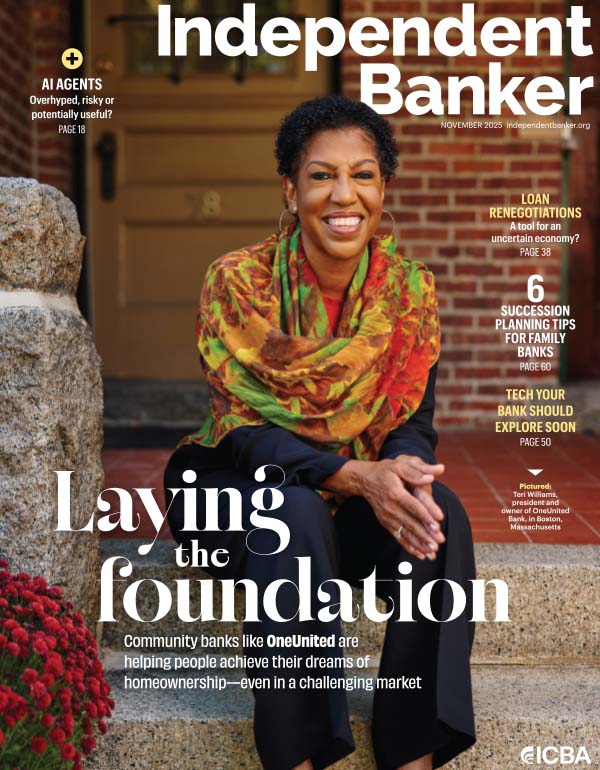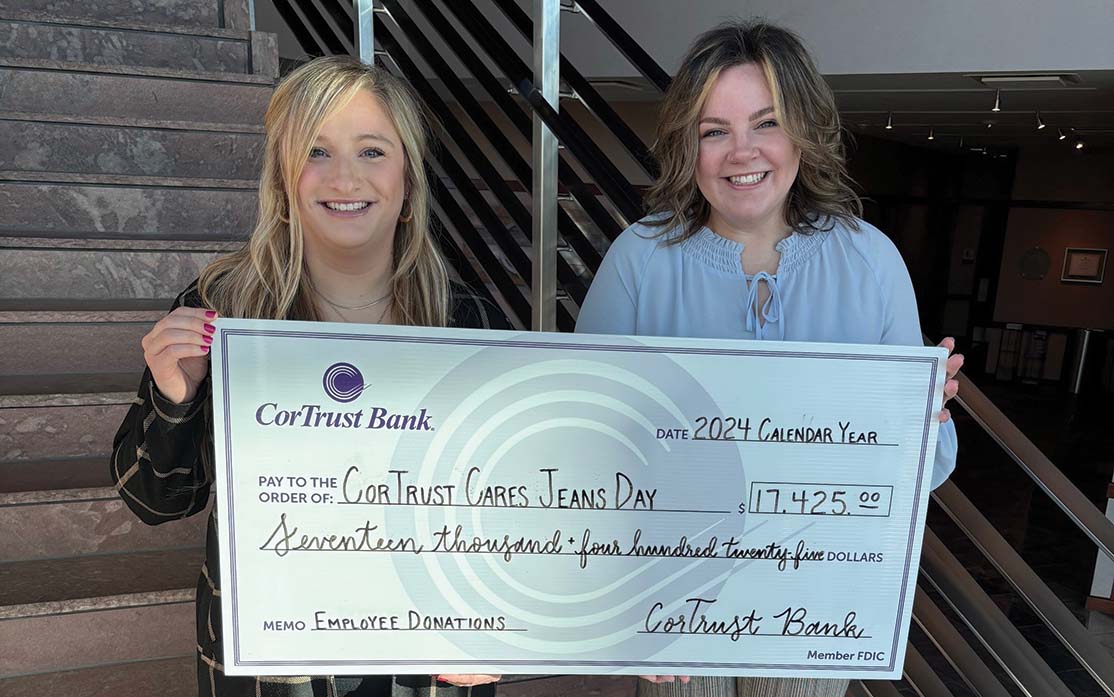The Independent Community Bankers of Colorado (ICBC), one of ICBA’s affiliated state associations, runs a leadership program that prepares future community banking leaders, and ICBA’s LEAD FWD Summit is its capstone event.
CJ Juleff, CEO of CJ Juleff & Associates in Westminster, Colorado, and ICBC’s Leadership Development Program curriculum developer, says the program has been in place for four years, with ICBA’s annual leadership conference included as part of the training for the past two years. She says it gives ICBC participants an invaluable opportunity to network with other Colorado community bankers and create bonds with their colleagues nationwide.
The LEAD FWD Summit, which will be held this year on Sept. 8–9, is just one of the ways ICBC members take advantage of ICBA’s membership benefits, educational and otherwise.
An ever-evolving program
Register for the 2025 LEAD FWD Summit
Looking to advance your career and immerse yourself in an educational experience focused on leadership strategies? The 2025 ICBA LEAD FWD Summit is Sept. 8–9 in Bloomington, Minn. Visit icba.org/LEADFWD to learn more.
Michael Van Norstrand, executive director of ICBC, says the state association’s Leadership Development Program has four key pillars: leadership, education, advocacy and networking. “Each month from February to November, there is a different activity or curriculum,” he says. “The LEAD FWD Summit has been a September staple from the original program launch in 2023.”
While the program’s principles stay the same from year to year, the ICBC team is constantly evolving the programming to include new opportunities for participants.
Van Norstrand says one of the newer features is a mentorship program, which ICBC introduced last year. “Enrollees were assigned to a volunteer banker and given a project to work on throughout the year, culminating with a group presentation at ‘graduation’ in November,” he says.
Juleff says another new addition for 2024 was a group project. “We included [an industry-centric] ‘challenge’ and divided the participants into groups to work together to research the challenge, make recommendations for meeting the challenge head on, and present their process and solution as a group at graduation,” she says.
“The majority of the leadership sessions were designed to provide the participants with critical skills to work through the challenge,” Juleff adds. “The most important key points, as shared in participant feedback, were the task and process roles of teams, conflict resolution, networking to increase one’s sphere of influence, and authentic leadership.”
Positive feedback
Van Norstrand was pleased with the outcome of ICBC’s 2024 leadership program. “The presentations made in November were outstanding, vastly exceeding expectations,” he says. “It’s comforting to know our banks are in good hands with the next generation of leaders.”
“Watching the final presentations by each group was incredible,” Juleff concurs. “We could see how each participant had grown over the 10 months they participated in the program.”
Both also shared thoughts on how they felt bank employees have benefited from the leadership program. “We have received overwhelmingly positive feedback from the participants, particularly with the new friends they’ve met from all over the state, who they said would continue to be their friends and resource-sharing partners,” says Van Norstrand.
Juleff adds, “The sometimes-rare opportunity to focus on professional development and growth afforded each participant the time to reflect on their strengths and weaknesses, to learn from others in a noncompetitive environment, and to grow as a professional.”
One leadership program participant’s experience
For participants like Adna Romero, a commercial lender at $500 million-asset Mountain Valley Bank in Scottsbluff, Nebraska, the Independent Community Bankers of Colorado leadership program offers a unique blend of training opportunities and professional growth.
“I participated in the ICBC leadership program for a couple of reasons,” says Romero. “First, it [is] a leadership [opportunity] for my bank. Second, there are networking opportunities with the other people in the program and for my own personal growth.”
When reflecting on the program’s benefits, Romero points to the friendships she made with the group and the invaluable information she gained. “I learned about my leadership style and how you can use your own style with other styles to be a better leader,” she says.
Romero highlights the ICBA LEAD FWD Summit as a standout experience, particularly the opportunity to travel with her leadership group and build stronger connections along the way.
“There was so much truly valuable information,” says Romero. “I hope to go again. In addition, I think the training gave me tools to look at leadership in different ways and [learn] how to incorporate other leadership styles to my own.”
ICBC drew on ICBA support
Julie Hanson, senior vice president of state education programs for ICBA Education, works closely with ICBC to discuss, review, and identify training opportunities provided by ICBA that will complement their offerings.
“Together, we ensure that community bankers have the resources and educational offerings they need to excel in their jobs,” Hanson says. “Both ICBC and ICBA focus on the community banking industry and are best positioned to understand their mission, their challenges, and their training and educational needs.”
Hanson is in frequent contact with Van Norstrand and Maelynn Lewis, ICBC’s administrative director, and sees the dedication they exhibit in providing leadership opportunities to their bankers. “ICBC is passionate about providing leadership opportunities both at the state and national level,” says Hanson. “They recognize the benefits of engaging with fellow bankers across the country to heighten the leadership experience.”
Hanson anticipates even closer and more collaborative roles between ICBA and its state associations on leadership training in future years. “For example, we are working together to identify where additional needs exist and how to complement each other’s efforts,” she says. “Keeping training current, engaging and relevant to community banks in this fast-paced, changing environment is a challenge we are addressing together.”
The future? “We are always looking for new ways to improve the program, and we appreciate ICBA’s willingness to be a part of it where possible,” says Van Norstrand.
Juleff adds, “We are always open to discuss opportunities that will benefit our members.”






